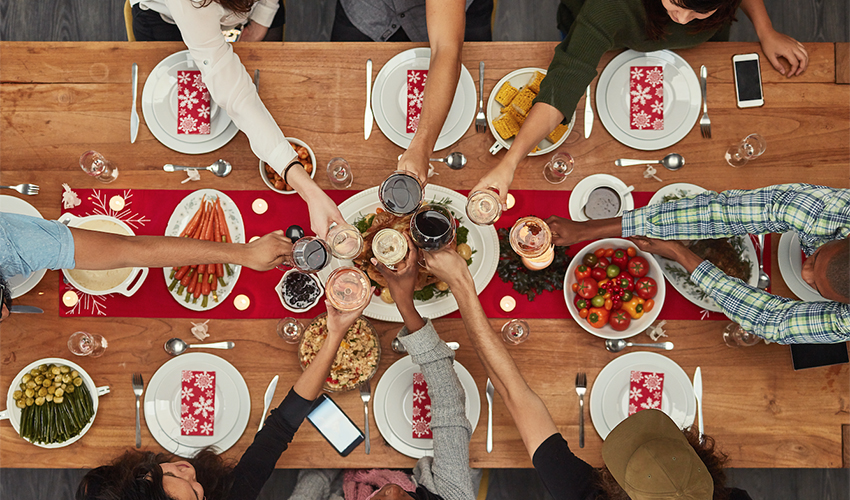Four tips for happier holidays

iStock/PeopleImages
University experts offer simple solutions for seasonal stress
The holidays are here again, so it’s time for festive family reunions, colorful decorations and jolly songs … as well as preparing huge meals, searching in vain for the perfect presents and ignoring Uncle George when he talks politics. How can you amp up the good cheer while avoiding the bad vibes? Four San Francisco State University faculty members have ideas that can help.
Tip #1: Don’t overdo it in the oven
Few things are more gratifying than sitting down for a big feast with the family — and few things are more stressful if you’re the one doing all the holiday cooking. But Timothy Shaw, chef instructor at San Francisco State’s Vista Room training restaurant, says keeping your cool in the kitchen is easy if you follow two simple rules.
“The main tip is to try to mix up the cooking methods of the food you are serving — one of the biggest stressors and limitations is oven space — so not everything needs to be roasted or heated up in the oven,” said Shaw, who’s been teaching Department of Hospitality & Tourism Management students at the Vista Room for seven semesters now. “Things like mashed potatoes or steamed green beans are good alternatives to something like potatoes au gratin or green bean casserole.”
Shaw’s second stress-reduction rule: Don’t mess with success. While jazzing up your menu with fancy new dishes might sound fun, remember that the holidays are a time for nostalgia and comfort.
“What a lot of people like about the holidays is that they are familiar and you have the same or similar foods year in and year out,” Shaw said. “I remember my father once changed his mother’s sausage and sage stuffing recipe and did one from the Food Network that had walnuts and apples. We all hated it. We wanted the familiar, not something new.”
Tip #2: Give the gift of time together
Another holiday hurdle is deciding how to buy the best gifts. SF State Professor of Psychology Ryan Howell, an expert on the link between happiness and how we spend our money, has some advice. Howell says that a mistake people often make is giving gifts that are a reflection of themselves rather than the recipient. When it comes to gift-giving, “we have this natural inclination to focus a little bit too much on ourselves,” Howell said. “Keep the receiver in mind.”
Howell also says that research shows that spending money to free up your own time — like outsourcing chores — usually makes people happier than buying material items. So rather than stressing about cooking the perfect Christmas dinner (even with Chef Shaw’s tips in mind), it might be better to spend a little extra on pre-made food and focus that time and energy on friends and family instead.
“If you try to save money to buy something else and don’t outsource the chore, you enjoy your purchase less,” said Howell.
Tip #3: Take a break from the family reunion to see Mother Nature
One of the simplest, least expensive ways to beat holiday stress — and to improve your health at the same time — is to get outside and enjoy nature, even if all you do is take a walk and look at some trees.
“Get outside,” says Assistant Professor of Recreation, Parks & Tourism Aiko Yoshino. “Visit a local park or national park. Gaze at beautiful scenery in a quiet place, or touch and smell a leaf in your yard. It will bring you joy.”
According to Yoshino, that’s not just one nature lover’s opinion: Many studies document the advantages of quality time in nature.
“Benefits include declining cortisol levels and blood pressure, improved distance vision, reduced sadness and anger, and improved attention span,” said Yoshino.
Tip #4: Remember how much we have in common … even with people who annoy us
According to a recent Pew Research Center poll, a majority of Americans find it stressful to talk to people with opposing political views. So imagine the stress when folks on the opposite ends of the aisle also end up sitting across from one another at the dining room table.
SF State Associate Professor of Political Science Francis Neely says that practicing tolerance and staying away from touchy subjects is key if you want to break bread without busting chops (or having yours busted).
“It’s just like you avoid bringing up that time your relative got so drunk,” Neely said. “There’s stuff you stay away from, and politics would be one of them.”
Neely, whose research delves into how political identities are formed and political information processed, says Americans for the most part have a common set of beliefs. But that common ground can be easy to forget when social media feels like a battleground.
“Clearly, we have differences, but we always have,” Neely said. “The stories about how much we have in common don’t get absorbed as much. So when I go to my relative who I disagree with politically, I try to remember that we’re all trying to do our best, we’re all trying to survive and do well. A lot of that comes from the same place.”